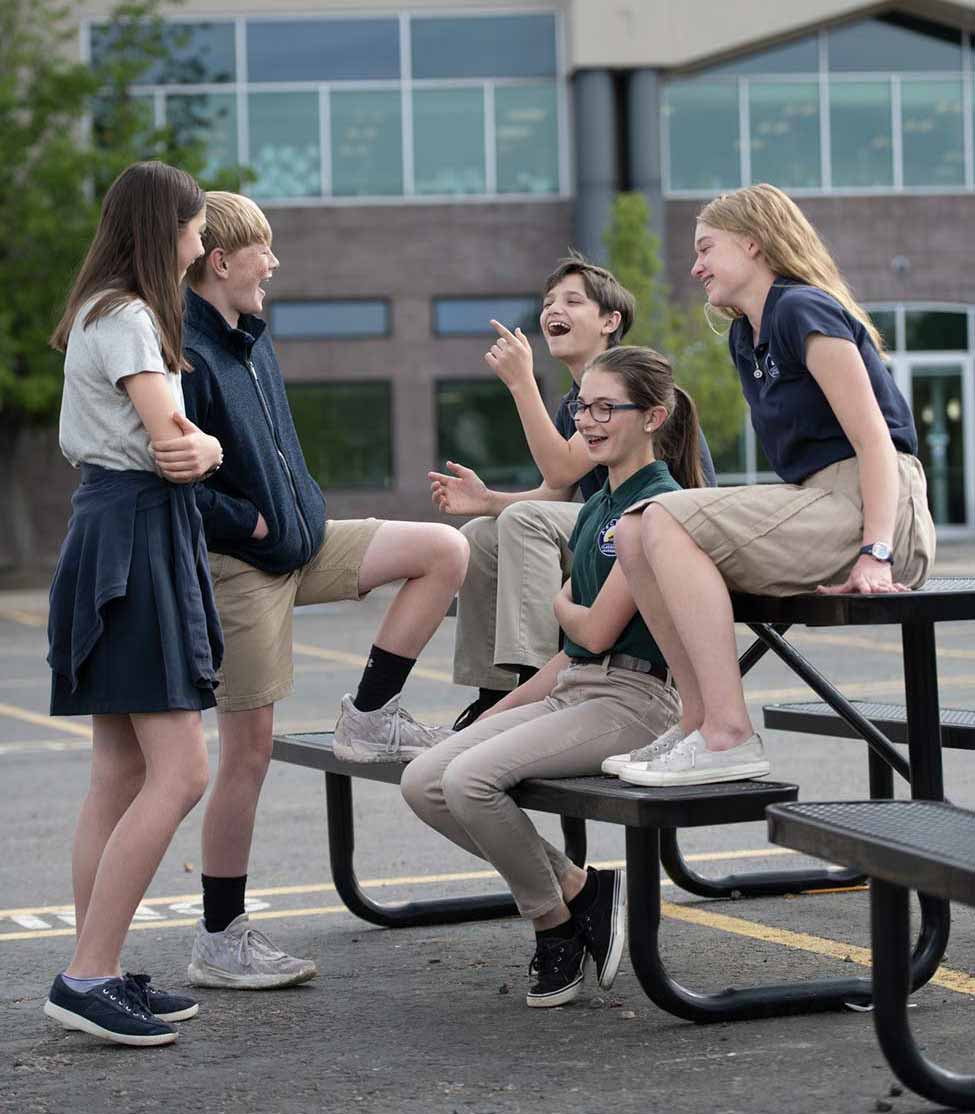Upper School students follow a traditional liberal arts and sciences sequence, with the primary focus on literature, mathematics, history, and science.
Literature
In order to be an educated, self-aware, and responsible person, students must become familiar with the great works of our tradition. The study of good literature also builds what has been called the ‘moral imagination.’ Ascent’s curriculum guides students through the best poems, stories, and books to align that imagination to what is good, true, and beautiful.
Mathematics
Singapore math uses a robust training approach that establishes algebraic thinking in grammar school, then builds on that to guide students through algebraic manipulation, geometric reasoning, and the generation of formulae. In upper grades they will then study trigonometry and calculus. These complex frameworks illuminate and enliven the cosmos in which we live.
History
The subject of history is often misunderstood as the memorization of dates, names, and events with little actual relevance to modern life. In reality, students who study history dive into a study of the human condition. By reading historical texts, students can understand the people of the past in their own words, and observe the great movements and accomplishments that have shaped history and the modern world.
Science
Through the study of scientific topics, students learn how to observe the universe and investigate the phenomena they observe. They practice critical questioning and reasoning through collecting data, building inferences, testing hypotheses, and applying theories and principles already discovered.
High School Course Progression
9th Grade | 10th Grade | 11th Grade | 12 Grade |
Ancient Literature | British Literature | American Literature | Modern Literature |
Western Civilization I (Greece and Rome | Western Civilization II (Medieval, Renaissance, Reformation, Enlightenment) | American History (Colonial America, American Revolution, 19th Century) | Modern World History |
Biology I | Chemistry I | Physics I | Anatomy and Physiology |
Geometry | Algebra II | Pre-Calculus | Calculus I |
Logic and Rhetoric | Physical Education | Political Philosophy | Moral Philosophy/Senior Capstone |
Fine Arts Elective | Fine Arts Elective | Moral Philosophy (1 semester) | Economics (1 semester), U.S. Government and Politics (1 semester) |
Latin | Latin or Modern Language | Music, Art | Fine Arts Elective |
Physical Education | Physical Education / Open Elective* | Latin or Modern Language | Latin or Modern Language |
Fine Arts Elective | Fine Arts Elective |
*Elective options vary by campus. Please contact the school for more information.
9th Grade
Ancient Literature
Western Civilization I (Greece and Rome)
Biology I
Geometry
Logic and Rhetoric
Fine Arts Elective
Latin
Physical Education
10th Grade
British Literature
Western Civilization II (Medieval, Renaissance, Reformation, Enlightenment)
Chemistry I
Algebra II
Physical Education
Fine Arts Elective
Latin or Modern Language
Physical Education / Open Elective*
11th Grade
American Literature
American History (Colonial America, American Revolution, 19th Century)
Physics I
Pre-Calculus
Political Philosophy
Moral Philosophy (1 semester)
Music, Art
Latin or Modern Language
Fine Arts Elective
12th Grade
Modern Language
Modern World History
Anatomy and Physiology
Calculus I
Moral Philosophy/Senior Capstone
Economics (1 semester), U.S. Government and Politics (1 semester)
Fine Arts Elective
Latin or Modern Language
Fine Arts Elective
*Elective options vary by campus. Please contact the school for more information.
Graduation Requirements
In order to graduate, all students are required to:
- Meet the credit requirement and complete the core courses as reflected in the below chart
- Complete a senior thesis with a grade of C- or higher
- Either of the following: Score at least 500 on the math section of the SAT, score at least 50 on the AFQT (Armed Services Vocational Aptitude Battery), or complete a math capstone
High School Credit Structure
In the following chart, one credit is equivalent to one year of study (or two semesters).
Students follow a 7-period schedule from 7:45 a.m. – 3 p.m., attending class five days a week. To be eligible for graduation, students are required to earn 27 credits* as follows:
English | 4 Credits |
Mathematics | 4 Credits |
Science | 4 Credits |
History | 4.5 Credits |
Government | 0.5 Credits |
Economics | 0.5 Credits |
Physical Education | 1 Credit |
Latin | 1 Credit |
Foreign Language | 3 Credits |
Composition | 0.5 Credit |
Rhetoric | 0.5 Credit |
Moral Philosophy | 0.5 Credit |
Fine Arts | 1 Credit |
Electives | 3.5 Credits |
The Senior Thesis
The senior thesis is the culmination of a student’s classical education and a rite of passage to a life of virtue and self-government. A satisfactory performance on the writing and presentation of the thesis is required for graduation.
The Focus:
Students choose a book from the curriculum and serves as a capstone project, one which brings together the things a student has learned during his or her time at the school.
The Method:
Each student writes, orally delivers, and defends a topic of his or her choosing that emerges from the curriculum. Each student adapts his or her paper into a speech that is delivered publicly and defended to a panel of faculty members.

